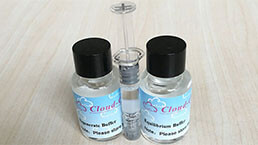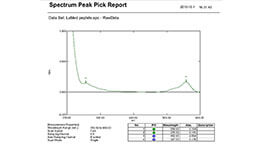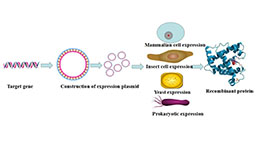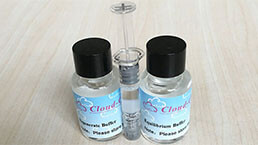Recombinant Troponin T Type 2, Cardiac (TNNT2) 

CMH2; cTnT; TnTc; Cardiomyopathy,Hypertrophic 2; Cardiac muscle troponin T
Overview
Properties
- Product No.RPD232Mu02
- Organism SpeciesMus musculus (Mouse) Same name, Different species.
-
Applications
Positive Control; Immunogen; SDS-PAGE; WB.
If bio-activity of the protein is needed, please check active protein.
Research use only - Downloadn/a
- CategoryCardiovascular biology
- Source Prokaryotic expression, Host E.coli
- Endotoxin Level<1.0EU per 1µg (determined by the LAL method)
- Subcellular Locationn/a
- Molecular Mass n/a, Accurate n/a(Analysis of differences refer to the manual)
- Residues & TagsN-terminal His Tag
- Buffer FormulationPBS, pH7.4, containing 0.01% SKL, 1mM DTT, 5% Trehalose and Proclin300.
- Traits Freeze-dried powder, Purity > 97%
- Isoelectric Pointn/a
Share your citation
Upload your experimental result
Review
Leave a message
Loading...
Sign into your account
Share a new citation as an author
Upload your experimental result
Review
Please attach serial No. on instruction manual


Contact us
Please fill in the blank.
Name*
Organization
Address
E-mail address*
Telephone
Inquiry*
Verification code*

Sequence
Usage
Reconstitute in PBS or others.
Storage
Avoid repeated freeze/thaw cycles. Store at 2-8°C for one month. Aliquot and store at -80°C for 12 months.
Stability
The thermal stability is described by the loss rate. The loss rate was determined by accelerated thermal degradation test, that is, incubate the protein at 37°C for 48h, and no obvious degradation and precipitation were observed. The loss rate is less than 5% within the expiration date under appropriate storage condition.
Increment services
-
 Endotoxin Removal Kit
Endotoxin Removal Kit
-
 BCA Protein Quantification Kit
BCA Protein Quantification Kit
-
 Protein Labeling Customized Service
Protein Labeling Customized Service
-
 Molecular Mass Marker for Protein
Molecular Mass Marker for Protein
-
 Recombinant Protein Customized Service
Recombinant Protein Customized Service
-
 Monoclonal Antibody Customized Service
Monoclonal Antibody Customized Service
-
 Polyclonal Antibody Customized Service
Polyclonal Antibody Customized Service
-
 Protein Activity Test Experiment Service
Protein Activity Test Experiment Service
-
 Immunoprecipitation (IP) Experiment Service
Immunoprecipitation (IP) Experiment Service
-
 Buffer
Buffer
-
 Endotoxin Removal Kit II
Endotoxin Removal Kit II
-
 Real Time PCR Experimental Service
Real Time PCR Experimental Service
-
 Spike RBD Protein (S-RBD)
Spike RBD Protein (S-RBD)
-
 Protein G
Protein G
-
 Protein A
Protein A
Citations
- Cardioprotective Effect of Sulphonated Formononetin on Acute Myocardial Infarction in RatsPubMed: 21232020
- Cardioprotective Effect of SMND-309, A Novel Derivate of Salvianolic Acid B on Acute Myocardial Infarction in RatsWiley: source
- Protective roles of Asperosaponin VI, a triterpene saponin isolated from Dipsacus asper Wall on acute myocardial infarction in ratsScienceDirect: S0014299909009984
- The altered expression profile of microRNAs in cardiopulmonary bypass canine models and the effects of mir-499 on myocardial ischemic reperfusion injuryPubMed: PMC3694448
- Salivary high‐sensitivity cardiac troponin T levels in patients with acute myocardial infarctionPubmed: 22834943
- In vivo and in vitro cardioprotective effects of Panax quinquefolium 20 (S)-protopanaxadiol saponins (PQDS), isolated from Panax quinquefoliumPubmed: 23700796
- The effects of caloric restriction and age on thyroid hormone signalling in the heart of ratsPl:Source
- Cardiomyopathy reverses with recovery of liver injury, cholestasis and cholanemia in mouse model of biliary fibrosisPubmed:24330504
- Cardioprotective Effect of Rhizomes of Acorus gramineus Against Isoproterenol-Induced Cardiac Damage in PigsPubmed:24420420
- Glutathione administration reduces mitochondrial damage and shifts cell death from necrosis to apoptosis in ageing diabetic mice hearts during exercisePubmed:25039894
- Crocin protects against doxorubicin-induced myocardial toxicity in rats through down-reCavia (Guinea pig )lation of inflammatory and apoptic pathwaysPubmed:26807765
- The Cardenolide Glycoside Acovenoside A Affords Protective Activity in Doxorubicin-Induced Cardiotoxicity in MicePubmed:27247000
- Troponins, heat shock proteins and glycogen phosphorylase BB in umbilical cord blood of complicated pregnancies.pubmed:27937003
- Outer Balloon Ligation Increases Success Rate of Ischemia-Reperfusion Injury Model in Mice.pubmed:27907155
- Rosuvastatin improves myocardial and neurological outcomes after asphyxial cardiac arrest and cardiopulmonary resuscitation in ratspubmed:28076830
- Imatinib attenuates cardiac fibrosis by inhibiting platelet-derived growth factor receptors activation in isoproterenol induced modelpubmed:28570599
- Cardioprotective effect of Notch signaling on the development of myocardial infarction complicated by diabetes mellituspubmed:29042932
- Increases in plasma corin levels following experimental myocardial infarction reflect the severity of ischemic injuryPubmed: 30192780
- Tissue suction-mediated gene transfer to the beating heart in micePubmed: 32027678
- Hormonal Response to Incremental and Continuous Exercise in Cyclists with Left Ventricle HypertrophyPubmed: 32148580
- Chlorogenic acid prevents acute myocardial infarction in rats by reducing inflammatory damage and oxidative stressPubmed: 33022535
- Norepinephrine Leads to More Cardiopulmonary Toxicities than Epinephrine by Catecholamine Overdose in RatsPubmed: 32947820
- Iron derived from autophagy-mediated ferritin degradation induces cardiomyocyte death and heart failure in mice33526170
- Pharmacological inhibition of arachidonate 12-lipoxygenase ameliorates myocardial ischemia-reperfusion injury in multiple species34536344
- Development of a novel ssDNA aptamer targeting cardiac troponin I and its clinical applications34673993
- Hydrogen therapy after resuscitation improves myocardial injury involving inhibition of autophagy in an asphyxial rat model of cardiac arrestPubmed:35495584






